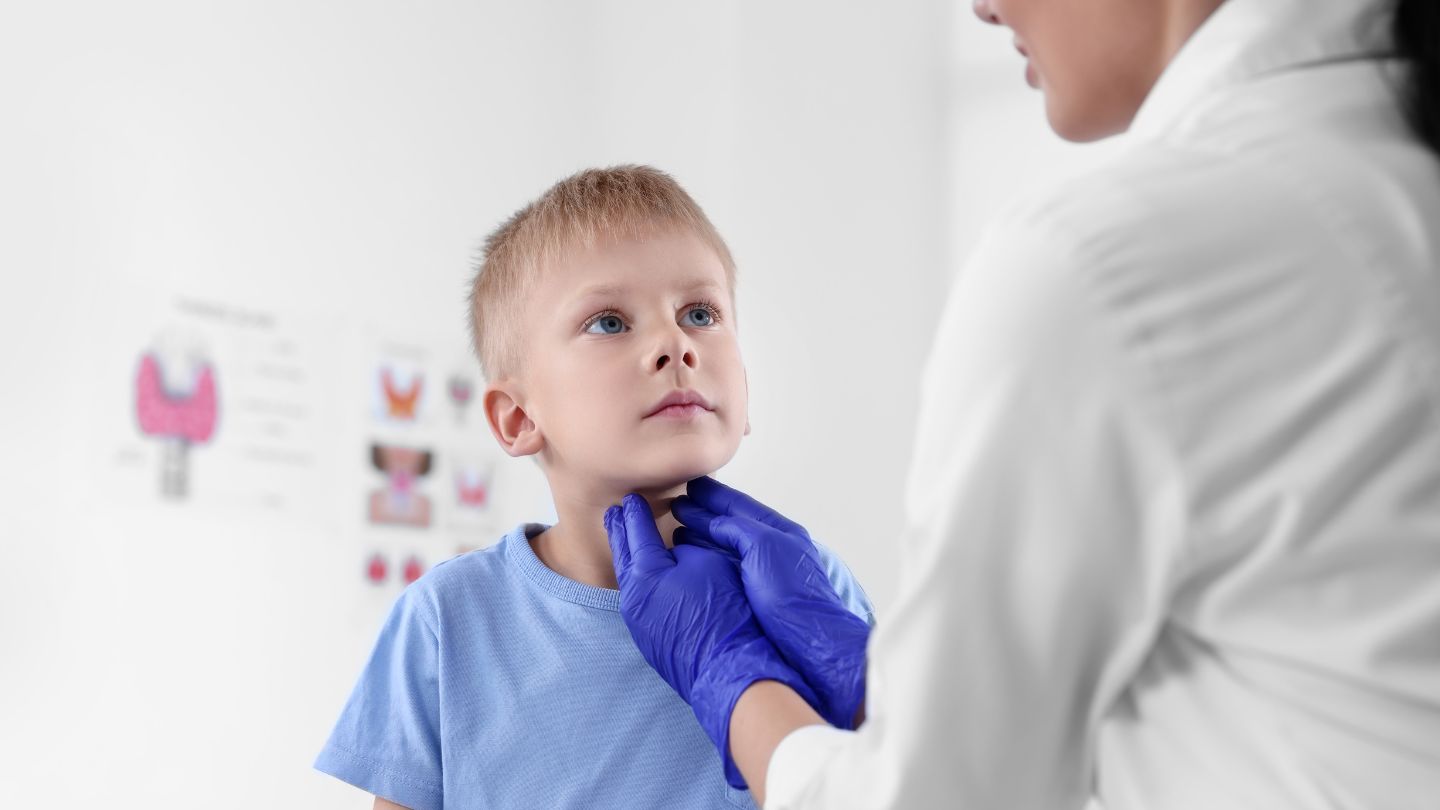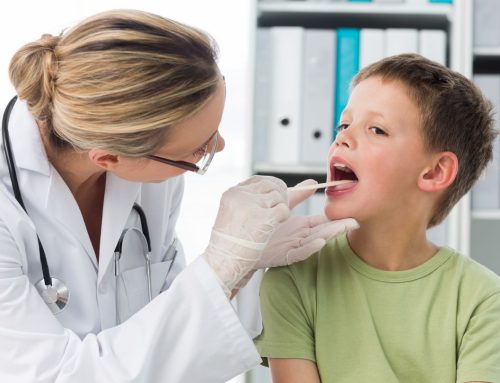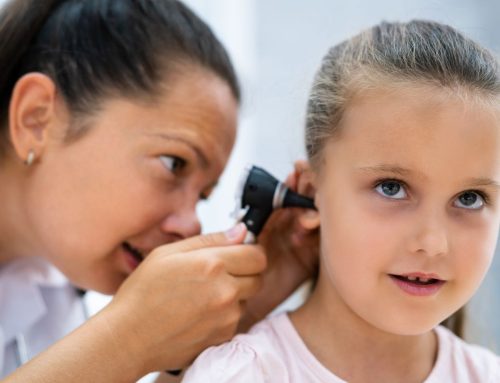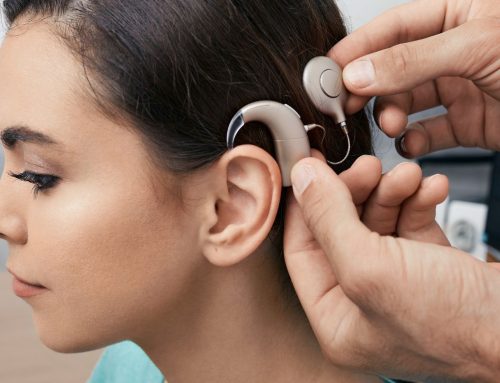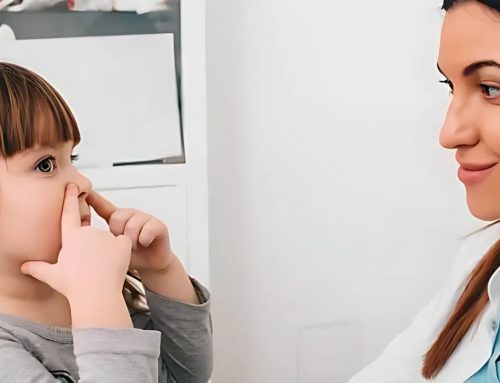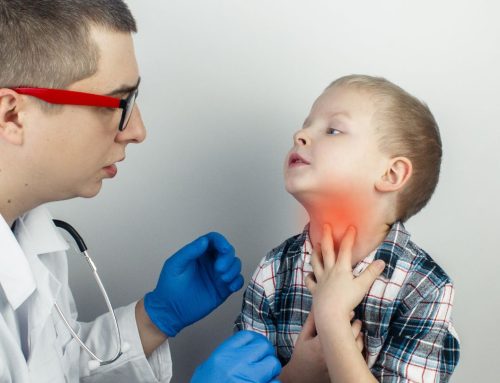Identifying the early warning signs of pediatric thyroid cancer—what parents should know—can make a significant difference in treatment outcomes. Parents should be aware of symptoms like neck lumps, voice changes, and swallowing difficulties. This blog will guide you on what to watch for and the next steps to take.
Key Takeaways
- Pediatric thyroid cancer, while rare, often presents as a noticeable lump in the neck and has an excellent prognosis when detected early.
- Common early signs include a lump in the neck, swollen lymph nodes, hoarseness, and difficulty swallowing or breathing, which require prompt medical evaluation.
- Key risk factors for developing pediatric thyroid cancer include certain genetic syndromes, radiation exposure, and family history, emphasizing the importance of early identification for better outcomes.
Understanding Pediatric Thyroid Cancer
Thyroid cancer, though relatively uncommon in children, is a serious health concern that deserves our attention. Situated in the neck, the butterfly-shaped thyroid gland plays an essential role by producing hormones crucial for regulating growth and metabolism. Cancer arises when mutations cause uncontrolled growth of thyroid cells within this gland, leading to the formation of tumors, which can impede the function of unaffected thyroid cells.
There are various types of thyroid cancer, each with distinct traits. Papillary thyroid cancer is most frequently diagnosed among children—representing about 90% of cases—and has a highly favorable outlook if caught early. Survival rates can surpass 95%. Nevertheless, it’s imperative to be aware that kids might also develop other varieties, such as medullary or differentiated forms and even rarer subtypes like anaplastic thyroid cancers. Although these constitute a minority within pediatric instances, recognition is key for proper diagnosis and treatment management.
Pediatric patients with this illness may often exhibit prominent lumps on their necks as initial indicators. Gaining knowledge about these fundamental facts aids us in detecting symptoms promptly to facilitate early intervention and guide decisions regarding clinical care pathways.
Common Early Signs of Thyroid Cancer in Children
The early diagnosis of thyroid cancer in children significantly enhances the effectiveness of treatment options. A noticeable lump, or thyroid nodule, on a child’s neck, often represents one of the earliest signs of this condition. Parents may spot swollen lymph nodes near this area as an indication that cancer might be present.
Should your child begin to exhibit changes such as hoarseness in their voice, it could point towards an early manifestation of thyroid cancer due to a tumor impacting the nerves linked with vocal cord function. Experience with swallowing difficulties or breathing issues can also suggest that a tumor is exerting pressure on either the esophagus or trachea, respectively. Although these symptoms alone are not conclusive evidence for thyroid cancer, they do necessitate professional medical consultation.
In rarer instances, atypical growths appearing on parts such as the tongue, lips, or eyelids might signal possible occurrences of thyroid cancer, too. Recognizing and responding promptly to these signs plays an essential role in securing effective management and care for those affected by this disease.
Risk Factors for Developing Thyroid Cancer in Children
Recognizing the risk elements linked to thyroid cancer in children can aid in its early detection and potentially thwart development. Certain inherited disorders, such as PTEN hamartoma tumor syndrome, may prompt the onset of thyroid cancer by age six. DICER1 syndrome is associated with a variety of tumors that include thyroid cancer.
Environmental influences are also significant contributors. Exposure to radiation during one’s youth is recognized as a prominent risk factor for developing thyroid cancer. Such exposure might arise from treatments directed at other cancers or from environmental contaminants. Notably, the earlier the child experiences this exposure, the greater their susceptibility to thyroid cancer.
A family history including conditions like familial adenomatous polyposis and multiple endocrine neoplasia type 2 (MEN2) signals an elevated chance for developing medullary thyroid cancer, among others, as they progress. Becoming aware of these factors could lead not only to early identification but also encourage timely medical intervention aimed at preventing childhood thyroid cancer.
Diagnostic Tests for Thyroid Cancer
When the presence of thyroid cancer is suspected, an array of diagnostic tests are conducted to ascertain whether a patient has been afflicted with thyroid cancer and to determine the appropriate course for treatment. Initially, ultrasound examinations play a pivotal role by delivering intricate visuals of both the thyroid gland and adjacent tissues. These images are integral in evaluating any masses’ dimensions and characteristics.
A fine needle aspiration biopsy is routinely employed to procure tissue samples from potential thyroid nodules. Utilizing ultrasound guidance augments accuracy during this process. Examining these samples under scrutiny is critical for detecting cancer cells within them.
In efforts to gauge how far the cancer may have propagated beyond its origin, Investigations such as MRI scans and chest X-rays might be used. Post-treatment follow-up includes testing levels of thyroglobulin along with monitoring both overall thyroid hormone production and specific amounts generated against each unit of stimulating hormone produced – all contributing factors towards tracking therapy success rates as well as staying vigilant against possible recurrence instances. It cannot be understated that swift detection paired with precise diagnosis plays an indispensable role in effectively combating this disease.
Treatment Options for Pediatric Thyroid Cancer
The treatment of pediatric thyroid cancer typically involves multiple methods. The initial and primary mode of care often includes a complete surgical removal, known as a total thyroidectomy, to extract the affected thyroid gland. With its extensive experience in conducting these surgeries, Children’s Healthcare of Atlanta provides expert specialized treatment tailored for young patients.
Subsequent to the surgery, practitioners administer radioactive iodine therapy with the intention of eradicating any remaining malignant cells. This radioiodine treatment is adept at destroying both residual healthy thyroid tissue and potential undetected cancerous cells from previous procedures. For children who have undergone the excision of their thyroid glands, it becomes vital to begin hormone replacement through regular doses of synthetic hormones mimicking natural ones lost due to surgery—a process called thyroid hormone therapy—to maintain bodily function balance. Occasionally, radiation therapy might be considered based on individual circumstances.
In specific instances where appropriate, targeted therapies may also be employed, which are designed specifically against certain proteins and enzymes that aid in tumorous growth within children suffering from this type of cancer cell proliferation—allowing for treatments personalized according to factors such as age or overall health condition. Clinical trials can provide opportunities to explore innovative experimental therapeutics, possibly leading to advanced techniques not yet commonly available outside research settings.
Importance of Regular Monitoring and Follow-up Care
Ongoing surveillance and post-treatment care play a pivotal role in the management of thyroid cancer in children. Follow-up visits are imperative for early detection of any indications that the thyroid cancer may have returned. Given that recurrences can happen several years after treatment, continuous oversight is essential.
An integrated approach involving pediatric ENT professionals and other medical experts ensures thorough follow-up for young patients who have been treated for thyroid tumors. This lifetime health supervision is key to addressing potential delayed side effects from earlier cancer therapies while safeguarding the child’s future health prospects.
Tailored plans for survivorship care outline protocols for subsequent physical examinations, assisting in managing overall health well into the future after treatment has concluded. Such consistent attention to care is crucial to uphold wellness and avert health issues related to thyroid cancer recurrence or past treatments.
Supporting Your Child Through Diagnosis and Treatment
Assisting a child who has been diagnosed with thyroid cancer and is undergoing treatment can present difficulties for family members. Fostering an open dialogue regarding emotions can aid in helping siblings manage their feelings and create a nurturing atmosphere.
Participation in support groups provides emotional comfort and helps families build connections with those experiencing comparable struggles. Preserving certain everyday habits offers stability for both parents and other children, which assists in mitigating stress and worry.
Acquiring comprehensive knowledge about the specifics of the child’s diagnosis of thyroid cancer can alleviate confusion and irritation. Parents may find it beneficial to keep a diary as a way to navigate through their own sentiments while monitoring their child’s journey throughout therapy.
Summary
Recognizing the early warning signs of pediatric thyroid cancer is crucial for ensuring the best possible outcomes for your child. From noticing unusual lumps in the neck to addressing persistent changes in their health, taking action quickly can make all the difference. Early detection, combined with timely medical intervention, provides a greater chance for effective treatment and long-term well-being.
At Pediatric Ear Nose and Throat of Atlanta, P.C., we specialize in providing top-tier care for children with a focus on conditions that require expert attention. If you’re looking for a trusted pediatric ENT specialist in Alpharetta, Duluth, Marietta, or Atlanta, our dedicated team is here to guide you every step of the way. Let us partner with you in safeguarding your child’s health, offering compassionate care and advanced expertise to ensure their comfort and recovery. Reach out to take the first step toward peace of mind and proactive care.
Frequently Asked Questions
What are the common early signs of thyroid cancer in children?
The common early signs of thyroid cancer in children include noticeable lumps on the neck, swollen lymph nodes, changes in voice, difficulty swallowing, and unusual bumps on the tongue, lips, or eyelids.
Early detection is crucial for effective treatment.
What are the risk factors for developing thyroid cancer in children?
The primary risk factors for developing thyroid cancer in children are genetic conditions such as PTEN hamartoma tumor syndrome, exposure to radiation, and a family history of thyroid cancer.
Recognizing these factors is essential for early detection and intervention.
How is thyroid cancer diagnosed in children?
Thyroid cancer in children is diagnosed through various tests including ultrasound exams, fine needle aspiration biopsies, and thyroid function tests.
These methods help accurately assess the presence of cancer in the thyroid gland.
What are the treatment options for pediatric thyroid cancer?
The primary treatment options for pediatric thyroid cancer consist of surgical removal of the thyroid gland, radioactive iodine therapy, hormone replacement therapy, and targeted therapy, with clinical trials as a further option.
It is essential to discuss the best approach tailored to the individual child’s needs with their healthcare provider.


